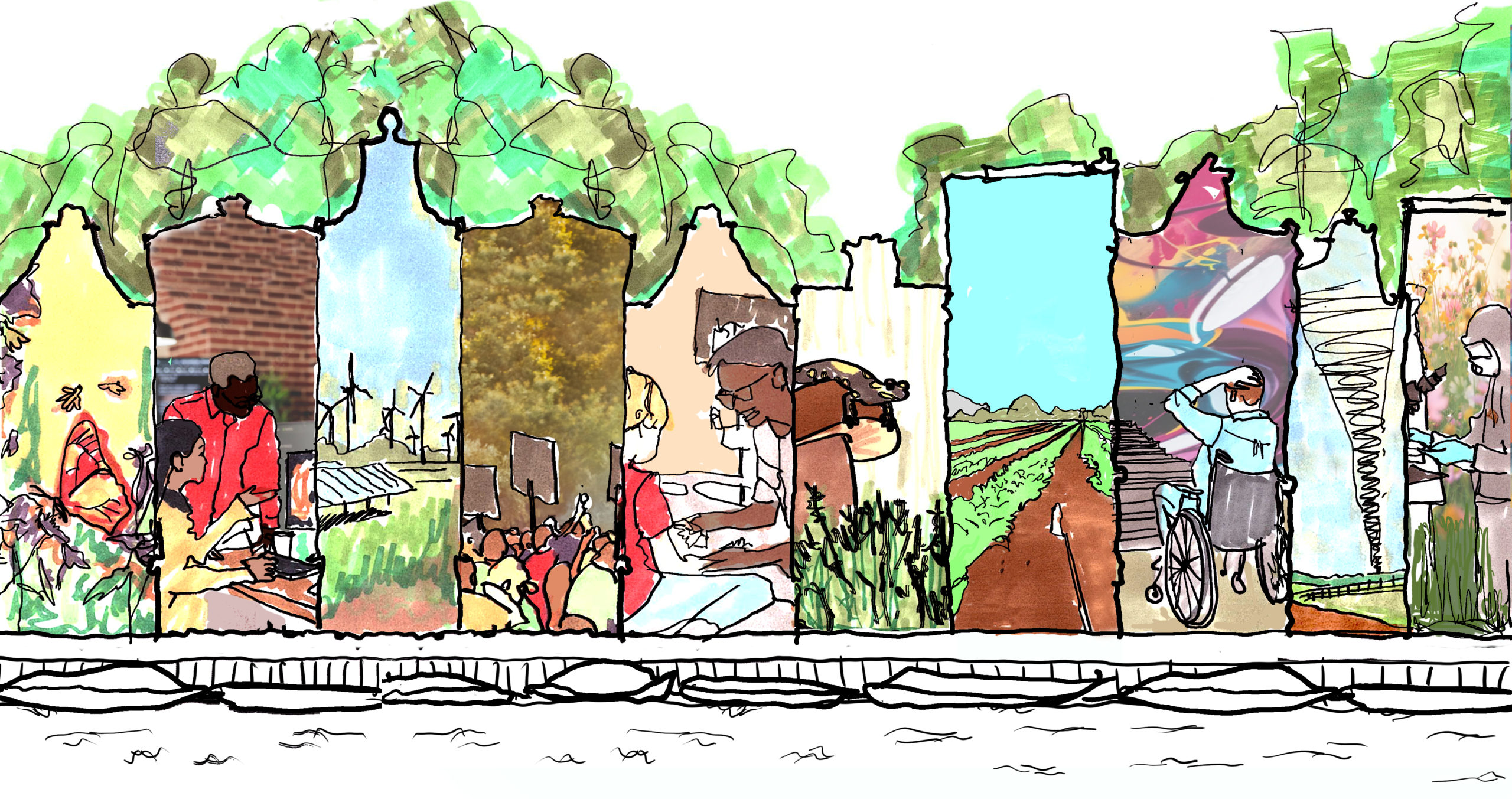DUTY OF CARE
Convening a panel is a great opportunity, but also a responsibility – to presenting colleagues, the conference, the field. We have tried to itemise below the various aspects of convenors’ work we’d like you to keep in mind over the conference process. Please get in touch if you have questions or need further clarification on any of this.
We would like you to:
- ensure you’ve read the Info page, including the Participation and delegate guidance section.
- circulate the Call for Abstracts among your networks
- be prompt on marking up your papers (but only once the call closes at 23:59 CET on 12 February 2024 – please do NOT mark any before the deadline!)
- communicate closely with your authors and discussants/chairs, answering their questions, reminding them to register once registration opens, figuring out the best sequence of presentations, advising newcomers on the length of presentations, discussing scheduling, keeping your eye on author and discussant/chair registrations and marking up and informing us of withdrawals
CALL FOR ABSTRACTS
The Call for Abstracts closes at 23:59 CET on 12 February 2024.
PANEL DETAILS
To view your panel, click on ![]() in the upper right corner of the conference website. Use your email and password when prompted to enter the platform. We suggest ticking ‘Remember me’ to stay logged in, if using your own computer, as this makes life easier later.
in the upper right corner of the conference website. Use your email and password when prompted to enter the platform. We suggest ticking ‘Remember me’ to stay logged in, if using your own computer, as this makes life easier later.
Once logged in, ‘Log in’ becomes ‘Logged in’ with a drop-down menu. Select ‘conference’ there and you’ll be directed to your accounts’ ‘Manage conferences’ page. Under ‘Current’ you’ll find EASST-4S 2024, clicking on it will display your details relating to the conference, including your panel.
You can edit your panel details by clicking on the Edit icon. If you update any fields, remember to click the ‘Save’ button. At this stage the ‘status’ of all proposals is ‘Pending’.
Please note: as a panel convenor you may act as a chair of your own panel without being listed in that role in the panel description. This is not counted as chairing once, it is part of the convening role.
MARKING UP PROPOSALS ONCE THE CALL FOR ABSTRACTS CLOSES
Please do not make any decisions about which proposals to accept before the Call for Abstracts ends (12 February 2024). Given that most colleagues work to the deadline, do not worry unduly if your complement of papers seems a little low – most proposals arrive during the final 24 hours of the call.
You can view and even edit individual proposals by clicking the eye/pencil icon in the abstract titles. However, to read all the proposals you have received, click the ‘Paper review sheet’ button at the top of the page, to download a PDF of all the proposals.

The Call for Abstracts is public, so you may receive proposals from people you do not know: please treat all proposals as equally as you can, and do not only accept the proposals you have solicited directly.
At the bottom of the page you will see five coloured boxes with options for the abstracts:

All the abstracts will start in the grey “Pending Papers” box. You can drag and drop abstracts to the different boxes depending on your decision, then click on “Save” to finalise the decision. You can also click on “Reset/Refresh” if you want to start over. Please drag the abstracts into the order in which you initially wish them to be presented.
Accepted and Rejected are self explanatory, to indicate if you wish to simply accept or reject an abstracts.
Withdrawn is for when authors inform you or us that they are no longer able to proceed with that proposal or attend the congress. They do not always email us with this news so if you receive such information later in the process, please remember to move their abstract to ‘Withdrawn’, so that we know, too.
Transfer is for proposals you would like to accept but don’t have space for, or don’t wish to accept perhaps because they aren’t on your panel’s theme, but feel should be included somewhere in the congress. We will try to rehouse the transfer abstracts in other panels. Please do not set anything to transfer simply because you feel bad about rejecting – if the abstract is of really poor quality, they should not be dragged through the transfer process and possibly end up being rejected again thrice over.
Please mark up all proposals by 4 March 2024, do not leave any as ‘pending’. After moving all papers, click on the ‘Save’ button beneath the list. All accepted papers will immediately show on your public panel page on the congress website, beneath the panel abstract.
PRIOR CIRCULATION OF PAPERS
The conference does not require prior circulation of papers/contributions; however if you wish to do this for your panel, the panel page can help avoid a lot of emailing to and from: each author can upload a PDF of their paper/contribution (not of their abstract!) into their abstract edit page and this is then available to co-panelists for download from your panel page on the site. If you subsequently wish these to be available more widely, please let us know so we can alter their visibility to delegates or public.
PANEL AND SESSION LENGTH
Each panel session slot will be 90 minutes long, accommodating a maximum of 5 presenters. The minimum number of papers/contributions in a Traditional or Combined Format Open Panel is 3, panels with fewer than 3 papers/contributions will be cancelled. The accepted authors in a cancelled panel will have the option to find a new panel that could host their presentation.
How sessions are allocated is largely the panel convenors’ decision, however the norm is to allot each presenter a maximum of 20 minutes (for presentation and questions/discussion) for panels of five papers. This norm also applies to experimental formats of knowledge expression in Combined Format Open Panels. The key is to respect the fact that many presenters have travelled a long way in order to be able to contribute and clearly need time to set out their argument.
Roundtables and closed panels may run for a maximum of one session, workshops up to two sessions (however, due to high attendance and capacity restrictions, we may need to reduce this number to one session).
Please note: the Call for Open Panels had an overwhelming response and over 390 panels were accepted. This may mean that panels can be offered a limited number of sessions – we may need to reduce the number of sessions to two per panel, depending on the number of paper proposals received, and the conference’s space/time constraints.
The division of a panel into sessions will be indicated in the programme, and the papers ordered within these sessions. While convenors may wish to amalgamate discussion time, where possible they should try to stick to the published distribution.
EMAILING AUTHORS - VERY IMPORTANT!
When you mark up an abstract, the decision will show in the author’s account. However our system does not send an email to the author alerting them of the status change, so please do your colleagues the courtesy of sending them an email informing them of your decision.
To make this easier click the ‘Send email’ button at the top of the panel edit page and choose which subsets of authors you wish to write to, and which method you wish to use to generate an email.

SUBSEQUENT ACTIONS
When all convenor decisions have been made and transfers done, we will allocate your panel the appropriate number of sessions. We aim to resolve all transfers by 9 April, and allocate sessions to panels by 16 April.
If you are aware of any limitations to the timetabling of your panel, please then state those in the ‘Requested timing’ field of the panel edit page. Note that we are already aware via our software of participants’ dual roles as convenors, presenters, chairs or discussants.
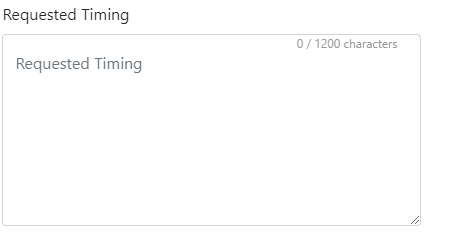
Once we’ve allocated your panel the requisite number of sessions, please return to the panel edit page to drag abstracts into the different sessions and/or to update the presentation order.
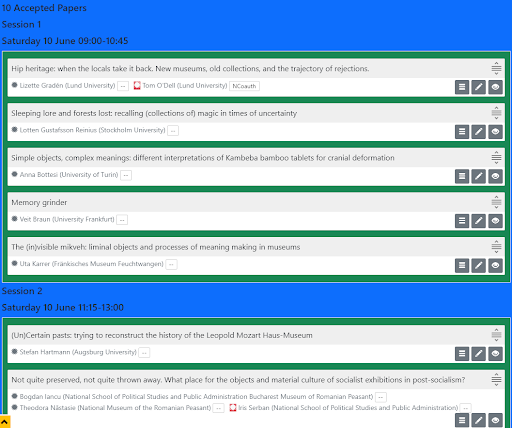
As convenors you have editorial control over your contributors’ abstracts. We will not proof the abstracts, so please ensure that both your authors and yourselves check their abstracts once you’ve accepted them. Authors can edit their own abstracts by logging in to their accounts via the conference website.
IN SHORT
Please disseminate the Call for Abstracts widely; then, after the call has ended, login and go to your panel edit page to see and process all proposals!
CALL FOR ABSTRACTS
The Call for Abstracts closes at 23:59 CET on 12 February 2024.
PANEL DETAILS
To view your panel, click on ![]() in the upper right corner of the conference website. Use your email and password when prompted to enter the platform. We suggest ticking ‘Remember me’ to stay logged in, if using your own computer, as this makes life easier later.
in the upper right corner of the conference website. Use your email and password when prompted to enter the platform. We suggest ticking ‘Remember me’ to stay logged in, if using your own computer, as this makes life easier later.
Once logged in, ‘Log in’ becomes ‘Logged in’ with a drop-down menu. Select ‘conference’ there and you’ll be directed to your accounts’ ‘Manage conferences’ page. Under ‘Current’ you’ll find EASST-4S 2024, clicking on it will display your details relating to the conference, including your panel.
You can edit your panel details by clicking on the Edit icon. If you update any fields, remember to click the ‘Save’ button. At this stage the ‘status’ of all proposals is ‘Pending’.
MARKING UP PROPOSALS ONCE THE CALL FOR ABSTRACTS CLOSES
Please do not make any decisions about which proposals to accept before the Call for Abstracts ends (12 February 2024). Given that most colleagues work to the deadline, do not worry unduly if your complement of papers seems a little low – most proposals arrive during the final 24 hours of the call.
You can view and even edit individual proposals by clicking the eye/pencil icon in the abstract titles. However, to read all the proposals you have received, click the ‘Paper review sheet’ button at the top of the page, to download a PDF of all the proposals.

The Call for Abstracts is public, so you may receive proposals from people you do not know: please treat all proposals as equally as you can, and do not only accept the proposals you have solicited directly.
At the bottom of the page you will see five coloured boxes with options for the abstracts:

All the abstracts will start in the grey “Pending Papers” box. You can drag and drop abstracts to the different boxes depending on your decision, then click on “Save” to finalise the decision. You can also click on “Reset/Refresh” if you want to start over. Please drag the abstracts into the order in which you initially wish them to be presented.
Accepted and Rejected are self explanatory, to indicate if you wish to simply accept or reject an abstracts.
Withdrawn is for when authors inform you or us that they are no longer able to proceed with that proposal or attend the congress. They do not always email us with this news so if you receive such information later in the process, please remember to move their abstract to ‘Withdrawn’, so that we know, too.
Transfer is for proposals you would like to accept but don’t have space for, or don’t wish to accept perhaps because they aren’t on your panel’s theme, but feel should be included somewhere in the congress. We will try to rehouse the transfer abstracts in other panels. Please do not set anything to transfer simply because you feel bad about rejecting – if the abstract is of really poor quality, they should not be dragged through the transfer process and possibly end up being rejected again thrice over.
Please mark up all proposals by 4 March 2024, do not leave any as ‘pending’. After moving all papers, click on the ‘Save’ button beneath the list. All accepted papers will immediately show on your public panel page on the congress website, beneath the panel abstract.
PRIOR CIRCULATION OF PAPERS
The conference does not require prior circulation of papers/contributions; however if you wish to do this for your panel, the panel page can help avoid a lot of emailing to and from: each author can upload a PDF of their paper/contribution (not of their abstract!) into their abstract edit page and this is then available to co-panelists for download from your panel page on the site. If you subsequently wish these to be available more widely, please let us know so we can alter their visibility to delegates or public.
PANEL AND SESSION LENGTH
Each panel session slot will be 90 minutes long, accommodating a maximum of five presenters. How sessions are allocated is largely the panel convenors’ decision, however the norm is to allot each presenter a maximum of 20 minutes (for presentation and questions/discussion) for panels of five papers. The key is to respect the fact that many presenters have travelled a long way in order to be able to contribute and clearly need time to set out their argument.
Workshops, roundtables and closed panels may run for a maximum of one session.
Please note: the Call for Open Panels had an overwhelming response and over 390 panels were accepted. This may mean that panels can be offered a limited number of sessions – we may need to reduce the number of sessions to two per panel, depending on the number of paper proposals received, and the conference’s space/time constraints.
The division of a panel into sessions will be indicated in the programme, and the papers ordered within these sessions. While convenors may wish to amalgamate discussion time, where possible they should try to stick to the published distribution.
EMAILING AUTHORS - VERY IMPORTANT!
When you mark up an abstract, the decision will show in the author’s account. However our system does not send an email to the author alerting them of the status change, so please do your colleagues the courtesy of sending them an email informing them of your decision.
To make this easier click the ‘Send email’ button at the top of the panel edit page and choose which subsets of authors you wish to write to, and which method you wish to use to generate an email.

SUBSEQUENT ACTIONS
When all convenor decisions have been made and transfers done, we will allocate your panel the appropriate number of sessions. We aim to resolve all transfers by 9 April, and allocate sessions to panels by 16 April.
If you are aware of any limitations to the timetabling of your panel, please then state those in the ‘Requested timing’ field of the panel edit page. Note that we are already aware via our software of participants’ dual roles as convenors, presenters, chairs or discussants.
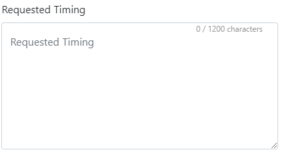
Once we’ve allocated your panel the requisite number of sessions, please return to the panel edit page to drag abstracts into the different sessions and/or to update the presentation order.
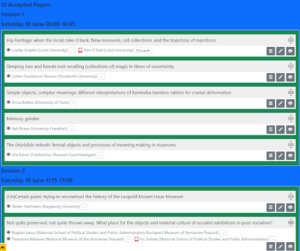
As convenors you have editorial control over your contributors’ abstracts. We will not proof the abstracts, so please ensure that both your authors and yourselves check their abstracts once you’ve accepted them. Authors can edit their own abstracts by logging in to their accounts via the conference website.
IN SHORT
Please disseminate the Call for Abstracts widely; then, after the call has ended, login and go to your panel edit page to see and process all proposals!


